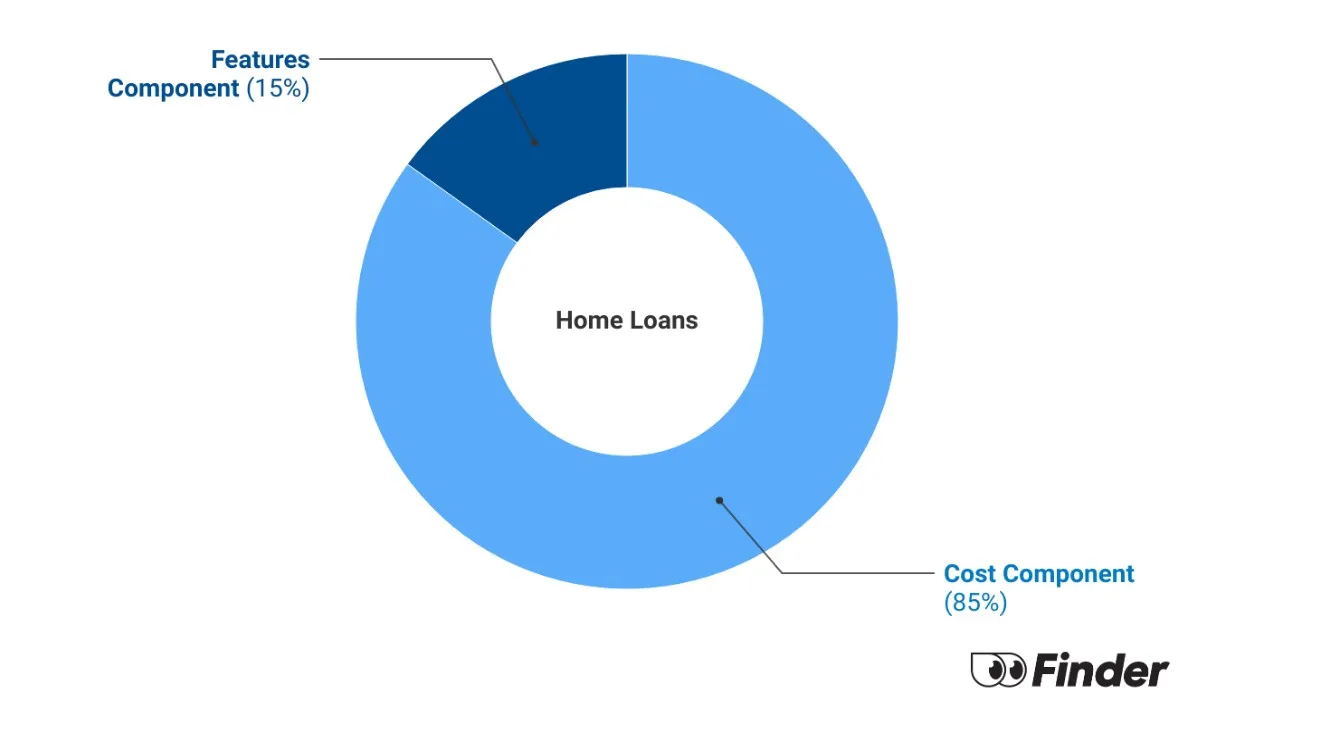What is Finder Score?
The Finder Score crunches 7,000 home loans across 120+ lenders. It takes into account the product's interest rate, fees and features, as well as the type of loan eg investor, variable, fixed rate - this gives you a simple score out of 10.
To provide a Score, we compare like-for-like loans. So if you're comparing the best home loans for cashback, you can see how each home loan stacks up against other home loans with the same borrower type, rate type and repayment type. We also take into consideration the amount of cashback offered when calculating the Score so you can tell if it's really worth it.
Read the full Finder Score breakdown
If you're looking for a honeymoon home loan with an upfront discount you need to make sure that the loan is a good product for you (regardless of the discount) and check that it doesn't have big discharge or switching fees. This could make refinancing more expensive once the honeymoon rate ends.What is an introductory home loan?
Introductory rate home loans are designed with first home buyers in mind. They offer a low rate of interest for a special promotional period (normally about a year), which helps keep your payments down. It’s not unusual for this low rate to be a whole percentage point below the standard rate.
Once the honeymoon rate period is over, the interest rate reverts to the product’s standard variable rate. If this revert rate is too high, you can consider refinancing to a cheaper home loan. This can take a little time and money, but will save you money in the long run.
Your lender may have another, similar loan product you could switch to instead of refinancing with a completely new lender.
Honeymoon home loan calculator
Are honeymoon rates the best choice for you?
The most attractive feature of a honeymoon loan is of course its low introductory rate, but before you choose your new home loan, consider the different ways you can save interest in the first years of your mortgage.
- Fees. Check the loan fees carefully. Most honeymoon rates are on variable home loan products. This means legally the lender cannot charge you a breaking fee. But if it's a fixed rate introductory discount then exiting the loan during this period can be costly because of fixed loan break costs.
- Loan purpose. If you're an investor you need an investment loan. If you're a home owner then it's an owner occupier loan. Most honeymoon home loans are for owner occupiers only.
- Features. Some loans allow you to make extra repayments and spend those extra repayments later via redraw if you need them. This can help you repay the loan faster and have extra cash when you need. An offset account does this but is even more flexible because the money is easier to access. Some introductory loans allow extra repayments but might be harder to find one with an offset account.
If you would like to see what effect additional repayments have on your mortgage, check our extra repayment calculator.
What should you do when the honeymoon rate ends?
Make note of your home loan's honeymoon period. It's usually only for one or two years. Your lender may notify you when the period ends, but they might not. Either way, check your home loan statement or log onto your lender's website and check the new rate your loan is now on. It's likely higher than the honeymoon rate.
Then you should do the following:
- Compare rates. Check the latest home loan rates and see if your new rate is competitive or not. If not, you should consider switching (also called refinancing).
- Find a new loan. Once you've compared rates find a new loan that suits your needs and has a more competitive rate.
- Check switching costs. Once the honeymoon rate is over you will most likely be on a variable rate (even if it was fixed before). The loan may have have a discharge or switching fee of a few hundred dollars. The new loan may have some upfront fees too, such as an application fee.
- Apply for the new loan. Organise your home loan application and hopefully you're successful. Your new lender will handle the change over and you just need to complete a discharge form with your old lender. And with that the honeymoon is over.
More guides on Finder
-
Home loan cashback offers to fill your wallet
Home loan cashback deals can help you refinance to a cheaper interest rate and get a lump sum cash payment. Compare the latest deals and check your eligibility today.
-
Household Capital home loans
Read our detailed review of reverse mortgage lender Household Capital.
-
Average Australian mortgage statistics
Our comprehensive guide to home loan statistics.
-
Trust home loans
Borrowing through a trust could be hugely beneficial if you are looking to protect your asset, and it also allows for flexibility of ownership in the future.
-
Illawarra Home Loans
Illawarra Home Loans has over 20 years experience in helping people in the Illawarra region obtain a mortgage.
-
Family pledge or guarantee home loans
Family pledge loans, or guarantor loans, allow you to use a close family member's property as security for your loan.
-
Low deposit home loans that’ll get your first home faster
You may be able to get a low deposit home loan with just a 5% cash deposit. Here are the lenders who are more likely to lend you a 95% loan.
-
Investment home loan rates – grab a cheap ticket to landlord town
The best investor home loan rates that have been offered in years have hit the market. Compare investment property loan rates today.
-
Best variable rates – turn on the offset
Find a great deal on a variable interest rate home loan from lenders large and small. Start comparing and saving today.
-
Best home loans with offset accounts
What is an offset account? It can save you thousands in interest and help you own your home sooner.
Ask a question

